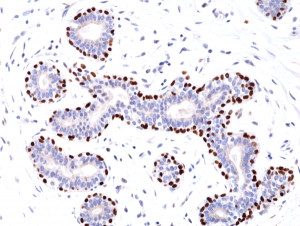anti-p63 (human) Rabbit Monoclonal (RM383)
Product Code:
REV-31-1269-00
REV-31-1269-00
Antibody Isotype:
Rabbit IgG
Rabbit IgG
Antibody Clonality:
Recombinant Antibody
Recombinant Antibody
Antibody Clone:
RM383
RM383
Regulatory Status:
RUO
RUO
Target Species:
Human
Human
Applications:
- Immunohistochemistry (IHC)
- Western Blot (WB)
Shipping:
Blue Ice
Blue Ice
Storage:
+4°C
+4°C
No additional charges, what you see is what you pay! *
| Code | Size | Price |
|---|
| REV-31-1269-00-R100 | 100 ul | £455.00 |
Quantity:
Prices exclude any Taxes / VAT
Stay in control of your spending. These prices have no additional charges, not even shipping!
* Rare exceptions are clearly labelled (only 0.14% of items!).
* Rare exceptions are clearly labelled (only 0.14% of items!).
Multibuy discounts available! Contact us to find what you can save.
This product comes from: Switzerland.
Typical lead time: 14-21 working days.
Contact us for more accurate information.
Typical lead time: 14-21 working days.
Contact us for more accurate information.
- Further Information
- Documents
- Show All
Further Information
Alternate Names/Synonyms:
Tumor Protein 63
Concentration:
N/A
EClass:
32160000
Form (Short):
liquid
Formulation:
Liquid. 50% Glycerol/PBS with 1% BSA and 0.09% sodium azide.
Handling Advice:
Avoid freeze/thaw cycles.
Immunogen:
A peptide corresponding to the area surrounding the C-terminus of human p63 (Tumor protein 63).
Long Description:
Recombinant Antibody. This antibody reacts to human p63 (Tumor protein 63). Applications: WB, IHC. Source: Rabbit. Liquid. 50% Glycerol/PBS with 1% BSA and 0.09% sodium azide. p63 (TP63; Tumor protein 63) acts as a sequence-specific DNA binding transcriptional activator or repressor. The isoforms contain a varying set of transactivation and auto-regulating transactivation inhibiting domains thus showing an isoform-specific activity. p63 may be required in conjunction with TP73/p73 for initiation of p53/TP53 dependent apoptosis in response to genotoxic insults and the presence of activated oncogenes. It is involved in Notch signaling by inducing JAG1 and JAG2. p63 plays a role in the regulation of epithelial morphogenesis. p63 is required for limb formation from the apical ectodermal ridge. It also activates transcription of the p21 promoter. Mutations affecting the gene can result in acro-dermato-ungual-lacrimal-tooth syndrome, ankyloblepharon-ectodermal defects-cleft lip/palate, ectrodactyly ectodermal dysplasia, split-hand/foot malformation 4, limb-mammary syndrome, ectodermal dysplasia and orofacial cleft. p63 immunostaining has utility for head and neck squamous cell carcinomas, differentiating prostatic adenocarcinoma and benign prostatic tissue. p63 is also helpful in distinguishing poorly differentiated squamous cell carcinoma from small cell carcinoma or adenocarcinoma. p63 should be strongly stained in poorly differentiated squamous cell, but negative in small cell or adenocarcinoma.
NCBI, Uniprot Number:
Q9H3D4?
Package Type:
Vial
Product Description:
p63 (TP63; Tumor protein 63) acts as a sequence-specific DNA binding transcriptional activator or repressor. The isoforms contain a varying set of transactivation and auto-regulating transactivation inhibiting domains thus showing an isoform-specific activity. p63 may be required in conjunction with TP73/p73 for initiation of p53/TP53 dependent apoptosis in response to genotoxic insults and the presence of activated oncogenes. It is involved in Notch signaling by inducing JAG1 and JAG2. p63 plays a role in the regulation of epithelial morphogenesis. p63 is required for limb formation from the apical ectodermal ridge. It also activates transcription of the p21 promoter. Mutations affecting the gene can result in acro-dermato-ungual-lacrimal-tooth syndrome, ankyloblepharon-ectodermal defects-cleft lip/palate, ectrodactyly ectodermal dysplasia, split-hand/foot malformation 4, limb-mammary syndrome, ectodermal dysplasia and orofacial cleft. p63 immunostaining has utility for head and neck squamous cell carcinomas, differentiating prostatic adenocarcinoma and benign prostatic tissue. p63 is also helpful in distinguishing poorly differentiated squamous cell carcinoma from small cell carcinoma or adenocarcinoma. p63 should be strongly stained in poorly differentiated squamous cell, but negative in small cell or adenocarcinoma.
Purity:
Protein A purified.
Source / Host:
Rabbit
Specificity:
This antibody reacts to human p63 (Tumor protein 63).
Transportation:
Non-hazardous
UNSPSC Category:
Primary Antibodies
UNSPSC Number:
12352203
Use & Stability:
Stable for at least 1 year after receipt when stored at -20°C.



